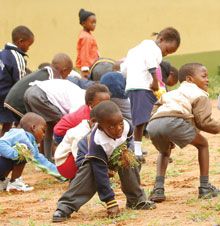Reduce children's schooling days
PATRICIA MAGANU
Staff Writer
| Friday June 13, 2008 00:00


Parents are of the view that, like other countries, schools should be closed, at least for some time during the winter season, but the Ministry of Education and Skills Development (MoESD) says that even though they are thinking about the issue they have their hands tied at the moment.
MoESD Principal Public Relations Officer, Nomsa Zuze, says that even though they think about the issue, they are too many factors playing against it.
'We do think about it because of the feedback that we get from the public but at this point we are tied,' she said. Zuze said that they are several factors that render this idea not very ideal at the moment. She told Mmegi that if that were to happen, the number of required days that a child should go to school in a year would be affected.
'Children are required to go to school a total of between 180 to 200 days in a year, excluding holidays, and we really do not know how we can work it around that and still be able to meet that requirement,' she said, adding that throughout the school year they are activities that are taking place, including examinations and compositions.
'Usually examinations are marked by teachers during the holidays. So we are using the same personnel and the same facilities,' she added.
Zuze said that even though the ministry does not totally turn a blind eye to the idea, it is not practical at the moment.
'Right now it is not possible with the way everything is set up,' she stated, saying that schools also act as protectors of children when parents go to work. She says that when a parent goes to work and takes the child to school they have killed two birds with one stone because that way they do not need anyone to stay at home with them.
'It is not a bad idea but they are still a lot of issues hindering us from taking that step,' said Zuze. Parents say that it seems inhumane for older people at Universities to go for vacations while young children have to wake up in the wee hours of the morning to go to school.
Parents interviewed randomly say that children should be given at least some vacation during the winter, especially in the months of June and July. They assert that the ministry can work something out. Banjamin Toile, a parent, says that the same people who made the system are the very people who can change it. 'If they cannot change their own system who can? Surely, they can arrange something. We are not talking about children who are dropped off and picked up from their schools by their parents here; we are talking about children who have to walk kilometres to get to the school, small children who come from low income families who cannot afford shoes and socks,' said an irate Toile. He further said that when one talks about issues like this one, the ministry and everybody pictures the children in towns, in good families who afford to drop them off at school or hire taxi services for them. 'In the same town, they are children who have to walk to school with very limited clothing and probably nothing for breakfast,' he lamented. Toile said that children like that are in towns and villages and they have to deal with the same weather conditions as a child who is well fed and transported. He went on to say that if the University of Botswana (UB) and any other learning institution in the world could do that then MoESD could certainly find a way around their system to give younger children some time off in the winter. 'If they have to go to schools for longer periods in warmer seasons then so be it because this is just not right. These are little children who depend on us to protect them and if we keep quiet who is going to help them?' he wondered.
Another parent, Boitshepo Lesarwa, who is a nurse, also says that the ministry can work out something to protect children from the harsh winter season. Lesarwa says that the situation is not as minor as the ministry wants to treat it.
'The ministry treats this issue as if it is one of those things they will look at in the future. To any parent, this should be a matter of urgency,' she said. She says that she sees adults who go to the clinics and fake illnesses so they could get sick leave just because of the cold weather. 'Who will speak for the children? I am not saying that they should not go to school at all; I am saying the ministry should come up with a way to reduce the number of days that they (children) go to school during the winter season,' she said. Lesarwa says that times have changed. 'We cannot compare ourselves to these children when we were growing up. Winters have gotten colder, the climate has changed and ailments have multiplied. So really we cannot compare,' she stated.
Watching children go to school in the morning during the winter is torture, especially for low-income areas and villages.
It is a sad sight indeed and one could wonder what it is that they are going to learn once they get to school.
In rural areas, numerous children have to walk for several kilometres to get to the school and usually they are without proper clothing.
